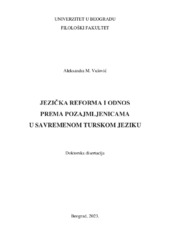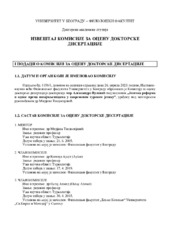Приказ основних података о дисертацији
Jezička reforma i odnos prema pozajmljenicama u savremenom turskom jeziku
ǂThe ǂlanguage reform and the treatment of loanwords in the contemporary Turkish language Языковая реформа и отношение к заимствованным словам в современном турецком языке
| dc.contributor.advisor | Teodosijević, Mirjana | |
| dc.creator | Vulović, Aleksandra | |
| dc.date.accessioned | 2023-11-04T12:13:19Z | |
| dc.date.available | 2023-11-04T12:13:19Z | |
| dc.date.issued | 2023-09-08 | |
| dc.identifier.uri | https://uvidok.rcub.bg.ac.rs/doccall/bitstream/handle/123456789/5310/Referat.pdf | |
| dc.identifier.uri | https://eteze.bg.ac.rs/application/showtheses?thesesId=9299 | |
| dc.identifier.uri | https://fedorabg.bg.ac.rs/fedora/get/o:31461/bdef:Content/download | |
| dc.identifier.uri | https://plus.cobiss.net/cobiss/sr/sr/bib/127241225 | |
| dc.identifier.uri | https://nardus.mpn.gov.rs/handle/123456789/21834 | |
| dc.description.abstract | Turski jezik sa svojom bogatom istorijom predstavlja neiscrpan izvor za istraživanje. Uzimajući u obzir da je jezička reforma imala najveći uticaj na razvoj turskog jezika odlučili smo da predmet našeg istraživanja bude epoha modernizacije i stvaranje čistog, nezavisnog turskog jezika. Na tom putu dostizanja jezičkog identiteta kao suštinskog dela nacionalnog identiteta, iniciran je pokret jezičkog purizma koji će imati dalekosežne rezultate. Dijahronijski pristup ovoj temi nam je pomogao da prikažemo potrebu za pokretanjem jezičke reforme u turskom. U prvim poglavljima analiziramo razvojne faze turskog jezika i prve pokušaje pojednostavljenja. Posebnu pažnju posvetili smo islamu čiji su uticaji u velikoj meri bili reflektovani i na jezik. Primanjem islama, od XI veka u turski jezik se slivaju elementi arapskog i persijskog jezika. Prvobitno su se ti lingvistički uticaji ograničavali na leksički nivo da bi se kasnije širenjem arapskog i persijskog kulturno-umetničkog uticaja strani elementi postali vidljivi i na drugim jezičkim nivoima. Turski jezik vremenom gubi svoje osobenosti i postaje hibridan jezik sačinjen od velikog procenta arapskih i persijskih reči. Nastaje osmanlijski jezik koji predstavlja mešavinu turskog, arapskog i persijskog jezika. Jedna od njegovih osnovnih odlika, pored stranog leksičkog fonda, bilo je i neodgovarajuće arapsko pismo. Ovo pismo nije odgovaralo fonetskom sistemu turskog, pre svega po pitanju vokala kojima je turski jezik bogat. Viševekovna upotreba arapskog pisma za posledicu je imala mali procenat pismenog stanovništva. U radu smo težili da detaljno opišemo neophodnost prelaska sa arapskog na latinično pismo i sve poteškoće koje su se prilikom usvajanja novog pisma javljale. Nakon uspešne reforme pisma počinje nova faza osavremenjivanja jezika. U cilju oslobađanja stranog uticaja, mnogi kulturni radnici pokušavaju da probude svest naroda o iskvarenom turskom jeziku. Svi pokušaji su bili bez epiloga sve do perioda Tanzimata kada se konačno pokreće pitanje jezika. Ovaj period reformi doprineo je menjanju toka razvoja turskog, ali opet u pravcu stranog uticaja, ovog puta zapadnog. Francuska je u to vreme bila jedna od najrazvijenijih, pa je njen uticaj zamenio prethodne. Na taj način turski nije dostigao željeni oblik već je i dalje bio u senci drugih jezika. Period turske istorije kome smo posvetili posebnu pažnju jeste republikanski period. Dolaskom prvog tuskog predsednika na vlast, Mustafe Kemala Ataturka, Turska doživljava preoporod. Reformistički način upravljanja državom i širenje turskog nacionalizma umnogome su doprineli stvaranju nezavisnog turskog jezika. Raskidanjem s tradicionalnim načinom života i uspostavljanjem novog, savremenog društvenog poretka, Republika Turska ulazi u krug civilizovanih, modernih država. Ataturk je od oronulog Osmanlijskog carstva napravio snažnu državu sa svojim nacionalnim identitetom. Postavljajući temelje za osavremenjivanje na svim državnim nivoima, veliku pažnju usmerio je ka rešavanju jezičkog pitanja. Osnovao je Tursko lingvističko društvo s ciljem da se bavi jezikom i sprovodi jezičku reformu. Pokret lingvističkog purizma u turskom je imao neverovatne rezultate. Uprkos protivnicima, jezička reforma, ili kako je Turci nazivaju revolucija, je uspešno sprovedena. U tezi smo nastojali da hronološkim putem opišemo sve faze kroz koje je turski tokom svoje istorije prolazio. Dotakli smo se i teme odnosa politike prema jeziku i kakav uticaj ona ima na razvoj jezika. Posebnim osvrtom na pozajmljenice ukazali smo na napore Turskog lingvističkog društva u iznalaženju turskih ekvivalenata radi očuvanja čistog turskog jezika. Savremene tendencije u turskom ne odstupaju mnogo od drugih jezika kod kojih je takođe prisutan veliki uticaj engleskog jezika. Odupiranje novoj terminologiji je težak proces jer se posredstvom savremenih tehnoloških otkrića u svaki jezik slivaju anglicizmi. Turski lingvisti i članovi Turskog lingvističkog društva naporno rade na smišljanju turskih ekvivalenata, ali i pored toga neretko je prisutna pojava upotrebe stranih termina. Mnogi eminentni turski lingvisti pišu na temu kvarenja jezika i upozoravaju na posledice. Polazeći od istorijskog stanovišta želeli smo da prikažemo promene koje je turski jezik doživeo. Pored toga analiziranjem savremenih tokova u jeziku cilj nam je bio da ukažemo na zabrinutost lingvista i naučnika za jezik koji je pod sve snažnijim uticajem novih načina komuniciranja i tehnoloških inovacija. Osnovni cilj rada bio je da se opiše način sprovođenja jezičke reforme i njen uspeh koji se najviše ogleda u dostizanju jezičke nezavisnosti. | sr |
| dc.description.abstract | Owing to its abundant history, the Turkish language represents an inexhaustible source for scientific research. Taking into account the fact that the language reform proved to have a decisive effect on the evolution of Turkish, its modernisation epoch and the consequent formation of pure and independent Turkish language is identified as a topic of this research. In this process of attaining language identity which is an essential part of national identity, a movement for linguistic purism was initiated that would prove to have far-reaching results. A diachronic approach to this issue has been of great use when explaining the need for initialising linguistic reform in the Turkish language. First chapters analyse stages in the evolution of Turkish language and very first simplification attempts. Particular attention is paid to Islam the impact of which greatly reflected on the language. Following the adoption of Islam, starting from the 11th century, there was a constant influx of Arabic and Persian language elements into Turkish. Originally, such linguistic impact was restricted to lexical aspect but, with the later expansion of Arabic and Persian cultural and artistic influences, foreign elements became visible in other linguistic aspects as well. Turkish was gradually deprived of its original features, becoming a hybrid language that comprised a great deal of Persian and Arabic loanwords. Ottoman Turkish emerged as a blend of Turkish, Arabic and Persian. One of its main characteristics, apart from the acquisition of foreign lexical fund, was the usage of inappropriate Arabic alphabet. This alphabet was not suited to Turkish phonetic system, primarily due to the vowels which Turkish abounds in. The usage of Arabic script over several centuries had for its consequence a low literacy rate. This paper attempts to describe in detail the urge for shift from Arabic to Latin alphabet and consequent difficulties that emerged with the adoption of new script. After the successful script reform, a new phase of language modernisation ensued. Aiming to minimize foreign impact, many cultural workers endeavoured to raise awareness of Turkish language corruption. All these attempts proved to be futile before the Tanzimat period, when the language issue was finally tackled. This period of reforms had a decisive impact on the change of direction in which the Turkish language evolved, but the impact again came from abroad, this time from West. France was one of the most developed countries of the time so its influence took a lead. This way Turkish failed to evolve into the wanted form and remained overshadowed by other languages. A particular attention in the paper is paid to the period of the Republic. Turkey experienced revival when Mustafa Kemal Ataturk rose to power. Reformed state government and Turkish nationalism expansion contributed greatly to the formation of independent Turkish language. The break-up with the traditional modus vivendi and a promotion of new, contemporary social system led Turkey into the company of civilized, modern states. Ataturk transformed the rotten Ottoman Empire into a powerful state with its national identity. Having laid foundations for modernisation of each state aspect, he particularly focused on solving the language issue. He established the Turkish Language Association with an aim to deal with language topics and perform language reform. The linguistic purism movement scored incredible results in the Turkish language. Despite its opponents, the language reform, or, revolution in Turkish words, was successfully carried out. The paper offers a chronological insight into the stages of Turkish language evolution. The attitude of politics towards the language and its impact on the language evolution is another topic discussed. With particular attention to loanwords, the paper points to the endeavours of the Turkish Language Association to find equivalent Turkish words so as to preserve the pure Turkish language. Current tendencies in Turkish do not differ much from other languages in which great English language influence is evident. Resisting new terminology is an arduous process since each language has an influx of English words due to modern technological breakthroughs. Turkish linguists and the members of Turkish Language Association work hard to produce Turkish equivalent words, but the usage of foreign terminology nevertheless occurs. Many eminent Turkish linguists write about the process of language degradation, warning of its consequences. Starting from historical viewpoint, the goal is to indicate the changes that the Turkish language has undergone. By analysing contemporary linguistic tendencies, the paper points to the concerns that linguists and scholars have about the language under increasing influence of new means of communication and technological innovations. The main goal of the paper is to describe the ways in which the language reform was carried out and its success that reflected most in the language independence. | en |
| dc.format | application/pdf | |
| dc.language | sr | |
| dc.publisher | Универзитет у Београду, Филолошки факултет | sr |
| dc.rights | openAccess | en |
| dc.rights.uri | https://creativecommons.org/licenses/by-nc-nd/4.0/ | |
| dc.source | Универзитет у Београду | sr |
| dc.subject | turski jezik, jezička reforma, pokret jezičkog purizma, pozajmljenice, turski ekvivalenti | sr |
| dc.subject | the Turkish language, language reform, the movement for language purism, loanwords, the Turkish equivalents | en |
| dc.title | Jezička reforma i odnos prema pozajmljenicama u savremenom turskom jeziku | sr |
| dc.title.alternative | ǂThe ǂlanguage reform and the treatment of loanwords in the contemporary Turkish language Языковая реформа и отношение к заимствованным словам в современном турецком языке | en |
| dc.type | doctoralThesis | |
| dc.rights.license | BY-NC-ND | |
| dc.identifier.fulltext | http://nardus.mpn.gov.rs/bitstream/id/156172/Disertacija_14204.pdf | |
| dc.identifier.fulltext | http://nardus.mpn.gov.rs/bitstream/id/156173/Izvestaj_Komisije_14204.pdf | |
| dc.identifier.rcub | https://hdl.handle.net/21.15107/rcub_nardus_21834 |



